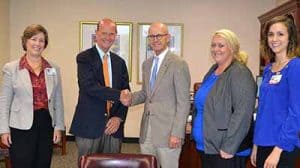Harps Foods Teams with College of Pharmacy
| Jan. 9, 2017 | Pharmacists at Harps Food Stores Inc. have long enjoyed developing relationships with their customers. So when given the opportunity, they didn’t want to just fill prescriptions; they wanted to work directly with patients to improve their health.
That’s when they looked for ways to fit medication therapy management (MTM) into the daily work and bustle of a pharmacy.
The Arkansas-based grocery chain developed a program to shift all non-clinical duties to pharmacy technicians so pharmacists can turn their attention to patient-centered activities. MTM is medical care provided by a pharmacist to ensure medications are helping patients achieve the best possible health from their prescriptions.
It can include reviewing a patient’s medications to make sure there are no unintended interactions and advising patients on any problems they are having with medications. They also can instruct patients on taking medications on schedule and give vaccinations.
While she was completing a pharmacy residency with Harps in 2015, Nikki Scott, Pharm. D., took on the project of creating a step-by-step protocol and training program for teaching MTM services and how pharmacists and technicians could put it into practice. Geoffrey Curran, Ph. D., professor, and Jeremy Thomas, Pharm. D., associate professor, both in the UAMS College of Pharmacy’s Department of Pharmacy Practice, mentored Scott in evaluating the impact of this innovation in pharmacy practice.
Duane Jones, Harps pharmacy district manager, was instrumental in providing the support to implement this program in the 35 pharmacies within the company. He said several other training programs taught pharmacists about MTM but none of them adequately solved the problem of integrating it into a busy, retail pharmacy environment. That’s why so few pharmacies were successfully doing it.

Duane Jones, second from left, shakes hands with College of Pharmacy Dean Keith Olsen before a meeting in October. Nicki Hilliard, left, Nikki Scott, second from right, and Leslie Moore also met with Jones and Olsen.
Scott and Jones in October 2015 trained 63 Harps pharmacists and 34 Harps pharmacy technicians how to put MTM into practice efficiently.
“The pharmacists and technicians will tell you their attitude about patient care has changed, and it’s much more gratifying,” Jones said. “The technicians actually run the logistics of the program. It lets the pharmacists concentrate on their clinical responsibilities, and the technicians feel like they are contributing more to patient care. They often know them the best. It creates a team approach to taking care of patients.”
The training program, named MTM The FutureToday (mtmthefuturetoday.com) impressed Nicki Hilliard, professor in the College of Pharmacy Department of Pharmacy Practice. College of Pharmacy Dean Keith Olsen, Pharm. D., shared her opinion and began discussions with Jones that resulted in a Memorandum of Understanding between the college and Harps. This alliance is working to promote MTM The Future Today in the state and around the country.
“We hopefully can change the practice so patients get the expertise a pharmacist can provide and help them with their care,” Hilliard said. “It can be a game changer. Pharmacists say they don’t have time to do the counseling and a medication review. This is a way to streamline that so they do have time. Most pharmacists got into the profession to help people, and this is just a tool to deliver that care.”
Hilliard also is president-elect of the American Pharmacists Association (APhA), with experience providing a nationwide training program and she plans to use her experience and networking opportunities to help expand the program throughout the country.
“We’re excited about our partnership with UAMS because it gives us the ability to make it available across the country to the entire profession,” Jones said. “If we can have just a fraction of the impact we’ve had on our 35 Harps stores with the rest of the profession, it will be a dynamic impact. It will help the profession improve patient care on a community pharmacy level.”
In the first 10 months of 2015, Harps pharmacists completed 35 medication reviews with patients. In the last two months of 2015, after implementing MTM The Future Today, they completed 260. Harps pharmacies in 2015 were not even placed in the top 50 in a national ranking of regional chains for health outcomes. In the first quarter of 2016, they ranked eighth and in the second quarter, fifth.
Medicare Part D reimburses pharmacies for MTM. Pharmacists across the profession have been challenged with making it work in a busy retail setting. Completing more medication reviews in MTM will help ensure that reimbursement continues and could convince private insurers of its advantages as health outcomes improve and costs drop, Jones said.
Medication errors cost about $300 billion annually. Jones said Medicare has realized involving pharmacists in correcting those errors can help bring that cost down.
Recently, Scott trained 25 pharmacists and 25 pharmacy technicians in Zanesville, Ohio, using MTM The Future Today, and their response was just as enthusiastic as that of their Harps counterparts, Scott said.
The UAMS College of Pharmacy will use its research resources to collect data about how the trained pharmacy professionals put MTM into practice and the results from it, Hilliard said.
Scott, now a Harps clinical pharmacist, said the main focus of her job has become MTM The Future Today. Leslie Moore, Pharm. D., who is the college’s Harps pharmacy resident this year, will be working in the training program as well.
